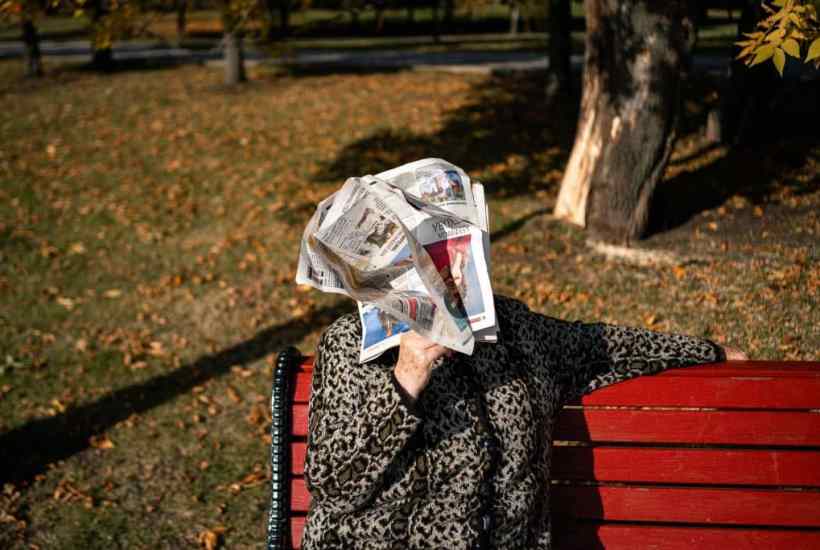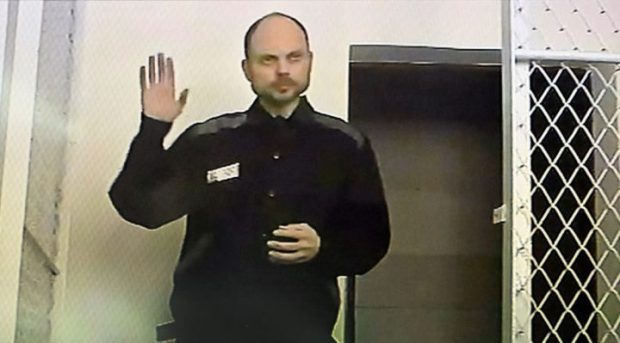‘They are lying to you here,’ declared the placard held aloft by the journalist who stormed the set of one of Russia’s most popular news channels this week. Marina Ovsyannikova also recorded a video saying she was ashamed to work for what she called a Kremlin propaganda network. So what are Russians really being told about Putin’s war in Ukraine?
British viewers might be surprised to learn there are plenty of similarities in what Russia’s media is reporting on compared to the Western media: the ever-increasing list of sanctions imposed by Europe and the United States on Russian companies and state figures, the shelling of Ukrainian cities and the meetings of leaders attempting to broker peace.
But although the facts are the same, the reality the Russian media is presenting is completely different. The bombing of Donetsk on Monday, which left at least 20 people dead, has been identified by Kiev as a Russian false-flag operation; but according to the Russian tabloid Komsomolskaya Pravda, Ukraine were, in fact, responsible, with the paper branding it a ‘barbarian’ war crime. Same event, two different versions.
The Russian media’s misinformation machine has shown a pattern of presenting Russia as a victim. In the early hours of 12 March, the Russian Orthodox Church in Oxford, St Nicholas the Wonderworker, was ransacked and burgled, with charity donations for Ukraine, relics and crosses stolen. The following day, Russia’s Foreign Affairs spokeswoman Maria Zakharova took to a press conference to condemn the burglary and personally blame British Foreign Secretary Liz Truss for what happened. Izvestiya quote her as saying:
‘The British Foreign Secretary Liz Truss should be happy. The campaign she has led of Russophobia and fakes has borne its devilish fruits in the very place she went to university.’
Where Russia isn’t playing the victim, elsewhere its president Putin is painted as a hero. Russia’s media made much of a meeting between Putin and Belorussian president Alexander Lukashenko that took place in Moscow last Friday. During their discussion, Putin promised to supply Belarus with the most up-to-date defence technology. In return, according to the broadsheet Izvestiya, Lukashenko revealed that not only were the Ukrainians planning an attack on the Donbass region, but also on Belarus itself. The paper quotes him as saying that the only reason Belarus avoided this fate was because of Russia’s ‘preventative’ attack. Not only is it widely acknowledged in the West that Ukraine had no plans to launch attacks in the Donbass region, but Lukashenko’s claim of a planned attack on Belarus can also be assumed to be fake news. There has been mounting speculation over the past week that, as Putin struggles to make ground in Ukraine, he may enlist Belarusian troops to help his war, and Lukashenko’s false justification easily fits the mould as a primer for this: laying the groundwork to condition the Russian and Belorussian people to accept Belarus’ involvement.
There are some things the Russian media definitely isn’t reporting. Domestic protests against the war haven’t been mentioned by the press. The incident in which Marina Ovsyannikova crashed the set of the Russian state TV Channel One on Monday shouting ‘No to war! Stop the war!’ made international headlines, earning her praise from leaders including French president Emmanuel Macron. Nevertheless, according to the Russian media, the event never took place: not one outlet has devoted even the smallest article to it.
However, some independent media have managed to continue reporting, albeit in a severely limited capacity. The paper Novaya Gazeta has published some reports from the Ukrainian front line depicting the reality of the conflict. Pointedly, they’ve managed to avoid using the word ‘war’, not by calling it a ‘special operation’ as ordered by the state, but simply blanking it out or replacing it with the phrase ‘word banned by the Russian Government’.
Strangled by the tight grip of Putin’s regime, there is only so much the media have been able to convey to the Russian people: most of the attacks in Ukraine are inflicted by the Ukrainians themselves, Western leaders have an anti-Russian agenda, and above all Russia must do what it can to protect itself in the face of such assaults.
All of this fuels the Russian government’s attempts to justify the war in Ukraine to its people. Many have questioned just how Russians are able to believe this narrative, but it is crucial to remember this misinformation campaign has been subtly escalating over a number of years. With most social media recently banned in the country, alternative sources of information for Russians are dwindling fast. This has allowed the Russian media to cultivate a form of Orwellian doublethink, presenting the Russian people with an alternative reality of the war in Ukraine.
Got something to add? Join the discussion and comment below.
Get 10 issues for just $10
Subscribe to The Spectator Australia today for the next 10 magazine issues, plus full online access, for just $10.



















Comments
Don't miss out
Join the conversation with other Spectator Australia readers. Subscribe to leave a comment.
SUBSCRIBEAlready a subscriber? Log in